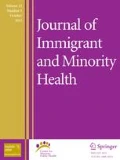Abstract
Background Since 2001, Massachusetts state law dictates that emergency department (ED) patients with limited English proficiency have the right to a professional interpreter. Methods one year later, for two 24-h periods, we interviewed adult patients presenting to four Boston EDs. We assessed language barriers and compared this need with the observed use and type of interpreter during the ED visit. Results We interviewed 530 patients (70% of eligible) and estimated that an interpreter was needed for 60 (11%; 95% confidence interval, 7–12%) patients. The primary interpreter for these clinical encounters was a physician (30%), friend or family member age ≥18 years (22%), hospital interpreter services (15%), younger family member (11%), or other hospital staff (17%). Conclusions We found that 11% of ED patients had significant language barriers, but use of professional medical interpreters remained low. One year after passage of legislation mandating access, use of professional medical interpreters remained inadequate.

References
Massachusetts General Laws Chapter 111, Sect. 25 J and Chapter 123, Sect. 23 A. An act requiring competent interpreter services in the delivery of certain acute health care services. Available at: http://www.mass.gov/legis/laws/seslaw00/sl000066.htm. Accessed February 26, 2008.
Sarver J, Baker DW. Effect of language barriers on follow-up appointments after an emergency department visit. J Gen Intern Med. 2000;15:256–64. doi:10.1111/j.1525-1497.2000.06469.x.
Jacobs EA, Lauderdale DS, Meltzer D, Shorey JM, Levinson W, Thisted RA. Impact of interpreter services on delivery of health care to limited-English-proficient patients. J Gen Intern Med. 2001;16:493–5. doi:10.1046/j.1525-1497.2001.016007468.x.
Rivadeneyra R, Elderkin-Thompson V, Silver RC, Waitzkin H. Patient centeredness in medical encounters requiring an interpreter. Am J Med. 2000;108:470–4. doi:10.1016/S0002-9343(99)00445-3.
Ngo-Metzger Q, Sorkin DH, Phillips RS. Providing high-quality care for limited English proficient patients: the importance of language concordance and interpreter use. J Gen Intern Med. 2007;22(Suppl 2):324–30. doi:10.1007/s11606-007-0340-z.
Baker DW, Parker RM, Williams MV, Coates WC, Pitkin K. Use and effectiveness of interpreters in an emergency department. J Am Med Assoc. 1996;275:783–8. doi:10.1001/jama.275.10.783.
Bernstein J, Bernstein E, Dave A, Hardt E, James T, Linden J, et al. Trained medical interpreters in the emergency department: effects on services, subsequent charges, and follow-up. J Immigr Health. 2002;4:171–6. doi:10.1023/A:1020125425820.
Carmona RH. Improving language access: a personal and national agenda. J Gen Intern Med. 2007;22(Suppl 2):277–8. doi:10.1007/s11606-007-0376-0.
Moreno MR, Otero-Sabogal R, Newman J. Assessing dual-role staff-interpreter linguistic competency in an integrated healthcare system. J Gen Intern Med. 2007;22(Suppl 2):277–8. doi:10.1007/s11606-007-0344-8.
Rosenberg E, Seller R, Leanza Y. Through interpreters’ eyes: comparing roles of professional and family interpreters. Patient Educ Couns. 2008;80:87–93. doi:10.1016/j.pec.2007.09.015.
Acknowledgment
Dr. Camargo is supported by Grant U01 AI-67693 from the National Institutes of Health (Bethesda, MD).
Author information
Authors and Affiliations
Corresponding author
Rights and permissions
About this article
Cite this article
Ginde, A.A., Clark, S. & Camargo, C.A. Language Barriers among Patients in Boston Emergency Departments: Use of Medical Interpreters After Passage of Interpreter Legislation. J Immigrant Minority Health 11, 527–530 (2009). https://doi.org/10.1007/s10903-008-9188-5
Received:
Accepted:
Published:
Issue Date:
DOI: https://doi.org/10.1007/s10903-008-9188-5

